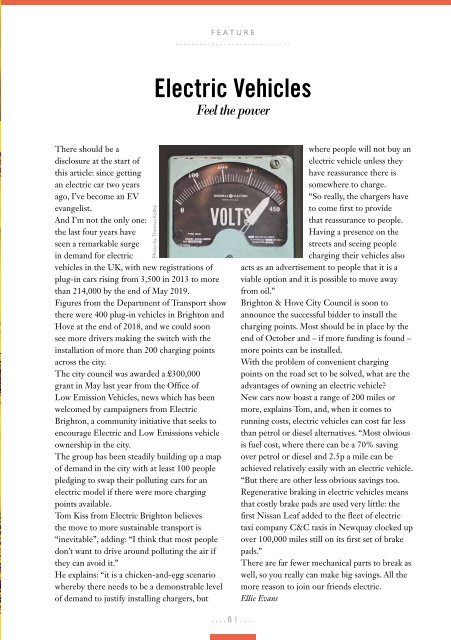Viva Brighton Issue #78 August 2019
Create successful ePaper yourself
Turn your PDF publications into a flip-book with our unique Google optimized e-Paper software.
FEATURE<br />
.............................<br />
Electric Vehicles<br />
Feel the power<br />
There should be a<br />
disclosure at the start of<br />
this article: since getting<br />
an electric car two years<br />
ago, I’ve become an EV<br />
evangelist.<br />
And I’m not the only one:<br />
the last four years have<br />
seen a remarkable surge<br />
in demand for electric<br />
vehicles in the UK, with new registrations of<br />
plug-in cars rising from 3,500 in 2013 to more<br />
than 214,000 by the end of May <strong>2019</strong>.<br />
Figures from the Department of Transport show<br />
there were 400 plug-in vehicles in <strong>Brighton</strong> and<br />
Hove at the end of 2018, and we could soon<br />
see more drivers making the switch with the<br />
installation of more than 200 charging points<br />
across the city.<br />
The city council was awarded a £300,000<br />
grant in May last year from the Office of<br />
Low Emission Vehicles, news which has been<br />
welcomed by campaigners from Electric<br />
<strong>Brighton</strong>, a community initiative that seeks to<br />
encourage Electric and Low Emissions vehicle<br />
ownership in the city.<br />
The group has been steadily building up a map<br />
of demand in the city with at least 100 people<br />
pledging to swap their polluting cars for an<br />
electric model if there were more charging<br />
points available.<br />
Tom Kiss from Electric <strong>Brighton</strong> believes<br />
the move to more sustainable transport is<br />
“inevitable”, adding: “I think that most people<br />
don’t want to drive around polluting the air if<br />
they can avoid it.”<br />
He explains: “it is a chicken-and-egg scenario<br />
whereby there needs to be a demonstrable level<br />
of demand to justify installing chargers, but<br />
Photo by Thomas Kelley<br />
where people will not buy an<br />
electric vehicle unless they<br />
have reassurance there is<br />
somewhere to charge.<br />
“So really, the chargers have<br />
to come first to provide<br />
that reassurance to people.<br />
Having a presence on the<br />
streets and seeing people<br />
charging their vehicles also<br />
acts as an advertisement to people that it is a<br />
viable option and it is possible to move away<br />
from oil.”<br />
<strong>Brighton</strong> & Hove City Council is soon to<br />
announce the successful bidder to install the<br />
charging points. Most should be in place by the<br />
end of October and – if more funding is found –<br />
more points can be installed.<br />
With the problem of convenient charging<br />
points on the road set to be solved, what are the<br />
advantages of owning an electric vehicle?<br />
New cars now boast a range of 200 miles or<br />
more, explains Tom, and, when it comes to<br />
running costs, electric vehicles can cost far less<br />
than petrol or diesel alternatives. “Most obvious<br />
is fuel cost, where there can be a 70% saving<br />
over petrol or diesel and 2.5p a mile can be<br />
achieved relatively easily with an electric vehicle.<br />
“But there are other less obvious savings too.<br />
Regenerative braking in electric vehicles means<br />
that costly brake pads are used very little: the<br />
first Nissan Leaf added to the fleet of electric<br />
taxi company C&C taxis in Newquay clocked up<br />
over 100,000 miles still on its first set of brake<br />
pads.”<br />
There are far fewer mechanical parts to break as<br />
well, so you really can make big savings. All the<br />
more reason to join our friends electric.<br />
Ellie Evans<br />
....81....

















